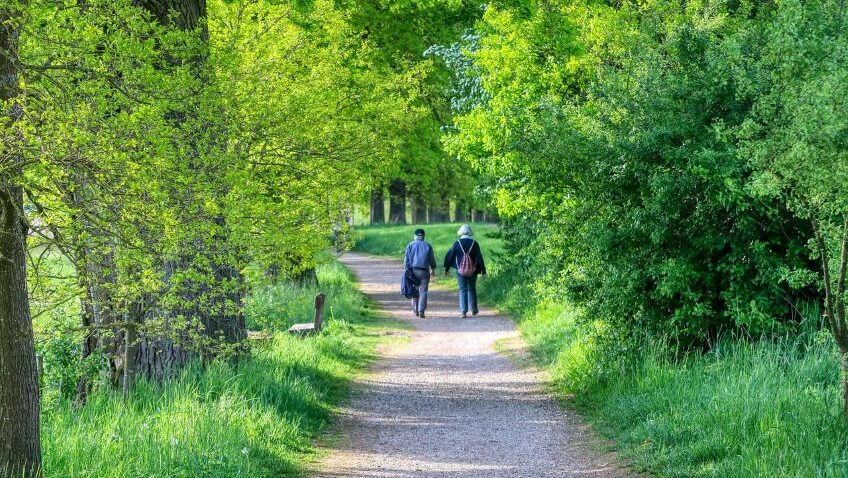As you get older, it’s just as important as ever to prioritise your mental health. If you’re experiencing some of the issues that can crop up as you get older, such as mobility problems, health concerns, or the loss of close friends, it can have a negative effect on your ability to stay positive. To help you with finding ways to boost your mental health, we’ve put together the following recommendations. Take a look below to find out more.
Getting Outside
Getting outside is important for mental health due to the numerous benefits it has to offer. Exposure to natural environments and fresh air can reduce stress, anxiety, and symptoms of depression. Sunlight helps regulate circadian rhythms and boosts vitamin D production, promoting mood and overall well-being. Outdoor activities like walking, gardening, or simply enjoying nature provide physical exercise, relaxation, and mindfulness opportunities. Being in natural surroundings also stimulates our senses, improves cognitive function, and enhances creativity. Additionally, outdoor settings offer a change of scenery, reducing feelings of monotony and confinement. Spending time outside rejuvenates the mind, uplifts the spirit, and contributes to a healthier, more balanced mental state. If you struggle with mobility issues, it can be difficult to get outside and enjoy the benefits it has to offer for your physical and mental health. To help you regain your independence, take a look at the folding mobility scooters from Mobility Solutions. They have a wide range of folding scooters that you can easily store in your home when they’re not used. You can also find out if you’re eligible for the Motability scheme to help cover the costs of leasing a mobility scooter.
Socialising More
Socialising is crucial for mental health as it promotes a sense of belonging, connection, and emotional well-being. Engaging in social interactions allows for meaningful relationships, support networks, and opportunities for self-expression. Socialising provides a platform to share experiences, thoughts, and emotions, reducing feelings of loneliness and isolation. It fosters a sense of purpose, boosts self-esteem, and enhances resilience in challenging times. Through social interactions, we gain perspective, empathy, and validation, which contribute to our overall mental well-being. Whether it’s spending time with friends, joining community groups, or participating in social activities, nurturing social connections positively impacts our mental health and enriches our lives.
Attending Counselling Sessions
Counselling is immensely beneficial for mental health as you age. It provides a safe and confidential space to explore and address emotional concerns, life transitions, and the unique challenges that come with ageing. Counselling offers guidance, coping strategies, and validation for the complex emotions and adjustments associated with ageing. It promotes self-reflection, personal growth, and improved self-awareness. Through therapy, individuals can gain valuable tools to manage grief, loss, anxiety, and depression. It also helps to strengthen resilience, build adaptive coping skills, and enhance overall well-being. Counselling empowers older adults to navigate life’s changes, maintain mental wellness, and live fulfilling and meaningful lives.
Regular Exercise
Regular gentle exercise is highly beneficial for mental health. Engaging in activities like walking, yoga, or swimming releases endorphins, the brain’s natural mood-boosting chemicals, promoting feelings of happiness and reducing symptoms of anxiety and depression. Exercise improves blood circulation, oxygenates the brain, and enhances cognitive function, memory, and concentration. It provides a healthy outlet for stress, tension, and pent-up emotions, promoting relaxation and improved sleep. Additionally, exercise boosts self-esteem, body image, and self-confidence, fostering a positive mindset. It offers a sense of accomplishment and empowerment, contributing to overall well-being and a more balanced mental state. Regular gentle exercise is a powerful tool for maintaining and improving mental health as you age.
Reducing Stress
Stress has a profound impact on mental health. Prolonged or chronic stress can lead to various mental health disorders, such as anxiety, depression, and burnout. It can disrupt sleep patterns, impair concentration, and negatively affect memory and cognitive abilities. To help reduce stress, consider the following advice:
• attending counselling sessions.
• speaking to close friends and family about your worries.
• decreasing any workloads you may have.
• seeking advice from your GP for medication to reduce stress.
• practising self-care and prioritising time for yourself to unwind.
Finding A New Hobby
Engaging in hobbies has a significant impact on mental health. Hobbies provide an outlet for self-expression, creativity, and personal enjoyment. They offer a break from daily stressors and provide a sense of purpose and accomplishment. Hobbies promote relaxation, reduce anxiety, and boost mood by releasing endorphins and increasing dopamine levels. They foster a sense of mastery, self-confidence, and self-esteem as skills improve. Hobbies also encourage social interaction and the formation of supportive communities, combating feelings of isolation and loneliness. Moreover, they enhance cognitive abilities, sharpen focus, and stimulate the brain. Hobbies contribute to improved mental well-being, emotional resilience, and a more balanced and fulfilling life.





